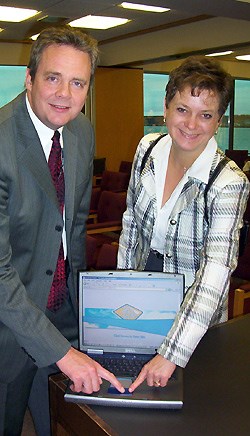Finding your way around the Sault and its 130 service agencies just got a little easier, says Donna St. Jules, project coordinator for the Street Smart Solution Project.
St. Jules was on hand at the Civic Centre Tuesday as a snazzy new Street Smart website was launched with a 'virtual' ribbon cutting on the site by City Police Chief Bob Davies and Social Services Manager Kim Streich-Poser (both shown).
"Street Smart will be the number one spot for social services agencies in the area," said St. Jules. "It offers quick and easy access to information and maps."
Dignitaries, project team members and service groups who'll access the site attended the ceremony to learn about the website.
It features a Geographic Information System (GIS) that allows people to find services they are looking for on an interactive and very user-friendly map.
It provides a way for more than 130 Sault-area social service agencies to update information on the 625 programs and services they offer, said St. Jules.
Also on the site, a database allows users to search for services, agencies or keywords, then map the destinations found.
The website is designed to support two books and an intervention officer all trying to help people who are homeless (or at risk of becoming homeless) stay safe and find the help they need.
The Street Smart Solution initiative began in the Sault in January 2002 when a need was identified to publish and maintain a current guide to services for homeless and at-risk citizens.
Later that year the Ontario Métis Aboriginal Association (OMAA) adopted the Street Smart project, producing and distributing the first 'hard-copy' guide.
In December of 2002, a project coordinator was hired to research and compile a comprehensive database of programs and services available to address the complex needs of those who are homeless or at risk.
Phase 1 of the project saw development, creation and distribution of two publications from Ontario Métis Aboriginal Association.
These complimentary publications were designed to get relevant information to both service providers (at whom the Street Smart Guide To Numbers You Need To Know is aimed) and individuals who are homeless or at risk (the Street Smart Guide To Things You Need To Know).
Canadian Mental Health Association partnered with the Safe Communities Partnership of Sault Ste. Marie to implement the second phase of the Street Smart project, part of which was launched today in the Russ Ramsey Room of the Civic Centre.
"Planning for the third phase is currently underway," said St. Jules.
